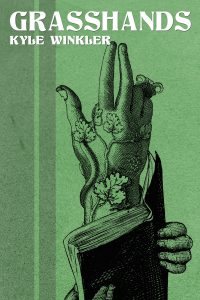
Kyle Winkler
JournalStone (January 19, 2024)
Reviewed by Nora B. Peevy
“Good and evil? … Wrong dichotomy. She preferred thinking of Less Pain or More Pain. More knowledge or Less Knowledge.”
With a loud “FA,” a glowing saltshaker, a singing pike, and a machete Sylvia, Albert, and Ms. Gamlin save the city of Caldecott, Indiana from Grasshands and the moss originating in the library that overtook the town. Kyle Winkler has written a unique and beautiful fairytale like no other I have read. If Neil Gaiman, Tim Burton, Lewis Carroll, J. R.R. Tolkien, and William Gibson created a baby, this is their love child.
How do you measure time? Do you measure it by the ticking of a clock, the crossing of the sun across the sky? Time is an abstract reality, but in Grasshands, time is an idea Sylvia, Albert, and Ms. Gamlin wrestle to comprehend. Grasshands doesn’t move by the fast-paced electronic world we live in, but in the ancient world of nature.
What are memories? Are they physical materials you hold in your hands, or do they live somewhere inside your head? Are we the sum of the physical items we own, our memories, the knowledge we accumulate over time? Grasshands wants to understand why we have evolved from following the laws and time of nature to following the abstract ideas of materials we own, but in doing so, Grasshands consumes humanity and almost destroys it.
If you had the chance to walk away from everything you owned and just live in the moment, would you? I recently encountered a painful experience with an online stalker who erased any memories, my photos, and bits of my writing. I didn’t have my photos backed up and I grieved for the loss of them for quite a while, but then I realized those photos, those precious moments live on in my memory and I didn’t need the physical images because the experiences with my loved ones are more important. It is a freeing outlook on life. I have catalogued my possessions, and I could walk away from it all and just disappear into the forest and be content. My material goods do not define me; in fact, they weigh me down and make me heavier. They are a responsibility separating me from Grasshands time and what is important. What defines me is what I believe in and my actions. This theme resonates throughout the novel. “She knew what she had conjured up all those years ago was amazing. But she (Sylvia) was done with amazement now. To amaze was to stupefy, and she couldn’t handle any more stupidity.” This is a thought from Sylvia in the middle of the novel when they are forging a plan to take out Grasshands and save Caldecott.
Humans are always looking for the next “new” gadget to complete them, when all around them is the most wonderful experience we have – each other and this planet. We think owning more possessions will make us happy, but it won’t. It is a prison. We don’t need to amaze ourselves with material experiences to make ourselves complete. We just need to walk out our front door and live in Grasshands time – to slow down. We rush to get up in time for work, slug some coffee, gulp our breakfast, work sixty-hour weeks, cram in yoga or Pilates, take classes to make the perfect charcuterie board, go to fancy dinner parties, enroll our children in so many activities they can no longer just be children, offer them so many electronics and buy so many for ourselves looking to fill our own happiness, but we are unfulfilled and empty. Money is an abstract idea as is time. Material goods are abstract happiness. We could walk away from all our possessions and out our front doors to live in Grasshands time and choose to be free and happy, but we tie ourselves to this miserable artificial existence. Grasshands is trying to understand this.
Do we even understand ourselves? Why do we need to know all the math formulas and scientific studies we crave, the philosophical ideas we sit around tables discussing, the periods of art we learn, the poets we interpret, how an engine works? Are we more fulfilled because of this knowledge? Does it enrich our life experience or does a sunrise or the sound of the waves crashing on the beach, or a nest of baby owls bring us more pleasure, not analyzing them, but simply being in the moment?
Kyle Winkler has raised a question society must face to find happiness. People only have so much time on this wonderful planet and must choose to use it wisely. Do we choose to live in Grasshands time or knowledge time? Do we measure our value by our material goods or by our life experiences? I will leave you with this quote, “Ms. Gamelin understood why these creatures, why Grasshands, was so powerful. She couldn’t stand to have her past so perfunctorily destroyed in front of her. She also couldn’t abide the source of destruction being made of her past and memories.”








